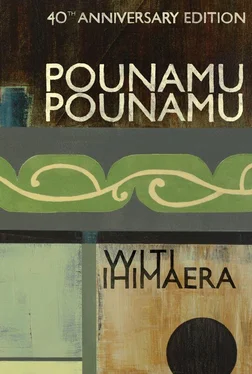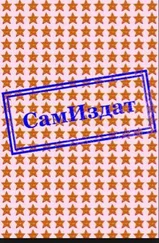‘Aue! Aue!’
This kaumatua, he fills the meeting house with the sound of his grief. After all, it was his task, surely, to transmit the knowledge to the new generation.
‘Aue! Aue!’
And from his grief springs a memory which adds to his despair. Of a time not long ago, when people from all Aotearoa gathered at this meeting house to celebrate the wedding of a child of this whanau.
The visitors, they had come from the Taranaki, from the Waikato, from the many parts of Te Ika a Maui, even from Te Waipounamu — the South Island. They had arrived for the hui throughout the day. By car, by bus, by train they had come, and the manawa of this whanau had beaten with joy at their gathering together.
It had been like his own time, this old one remembers. The children laughing and playing around the meeting house. The men and women renewing their friendships. The laughing and the weeping. The sweet smell of the hangi, and the sudden clouds of steam as the kai was taken from the earth. The girls swaying past the young men, eyeing the ones they wanted. The boys standing together, both bold and shy, but hiding their shyness beneath their jokes and bantering. The kuias gossiping in the cookhouse. The big wedding kai, and the bride and groom pretending not to hear the jokes about their first night to be spent together. The singing of the old songs. The cooks coming into the hall in their gumboots and old clothes to sing with the guests:
Karangatia ra! Karangatia ra!
Powhiritia ra, nga iwi o te motu
Ki runga o Turanga. Haere mai!
Call them! Call them!
Welcome them, the people of the land
Coming onto this marae, Turanga.
Welcome!
Ae, it had indeed been like the old times. The laughter and the joy had sung through the afternoon into the night. And he had sat with the other old men, watching the young people dancing in the hall.
Then it had happened. Late in the night. Raised voices. The sound of quarrelling.
‘Koro! Come quick!’
A mokopuna had grabbed his hand and pulled him outside, along the path to the dining room. More visitors had arrived. They had come from the Whangarei, and they were tired and hungry. He saw their faces in the light. But people of his whanau, they were quarrelling with the visitors. They would not open the door to the storeroom. It was locked now. There would be no kai for these visitors. They had come too late. Heart was locking out heart.
He had been stunned, this old one. Always there was food, always aroha, always open heart. That was the Maori way. Aroha.
And he had said to his mokopuna:
‘Te toki. Homai te toki. The axe. Bring me the axe.’
The crowd had heard his whispered fury. They parted for him. His tokotoko, his walking stick, it supported him as he approached the door. The music stopped in the hall. The kanikani, the dancing, stopped. People gathered. His fury gathered. The axe in his hand. He lifted it and …
‘Aue.’
The first blow upon the locked door.
‘Aue.’
His anger showing in his face.
‘Aue.’
The wood splintering beneath the blade.
‘Aue.’
His heart splintering too.
He gave his anger to the axe. He gave his sorrow to the blows upon the door. The axe rose and fell, rose and fell, and it flashed silver from the light.
Then it was done. The door gave way. Silence fell. He turned to the visitors. His voice was strained with agony.
‘Haere mai, e te manuhiri. Haere mai. Haere mai. Come, visitors. Come. Enter.’
He had opened his arms to them. Then, trembling, he had pointed at the splintered door.
‘Anei ra toku whakama … See? Look upon my shame.’
Then he had walked away, not looking back. Away from the light into the darkness.
This kaumatua, the memory falls away from him. He sees the darkness gathering quickly in the meeting house. How long has he been here, contemplating the changing world?
This old one, he grips his tokotoko and stands. Aue, he has lingered too long. One last look at this meeting house. The carved panels glint in the darkness. The kowhaiwhai designs flash with the falling sun. The evening wind flutters the black veils which hang upon the photographs of his dead.
So still he stands, this kaumatua, that he seems to merge into the meeting house and become a carved figure himself. Then his lips move. One last whisper to this meeting house, and he turns and walks away.
‘No wai te he?’
He walks along the dusty road, through the village. The houses are clustered close together. A truck speeds past him.
‘No wai te he?’
He hears a gramophone blaring loudly from one of the houses. He sees into a lighted window, where the walls are covered with glossy pictures that have been carefully cut out of magazines. A group of young people are gathered around another house, laughing and singing party songs. They beckon him to come and join them.
‘No wai te he?’
Down the path from the village he goes, to where his own house lies on the beach, apart from the village. Through the manuka, down the cliff to the sand he walks. The sea is calm, the waves softly rippling. And far away the sun is setting, slowly drowning in the water.
‘No wai te he?’
Then he sees a cloud of gulls blackening the sky. Their guttural screams fill the air. They dive and swoop and cluster upon a dark mound, moving feebly in the eddying water.
And as the old one approaches, he sees that it is a whale, stranded in the breakwater, threshing in the sand, already stripped of flesh by the falling gulls. The water is washed with red, the foam flecked with blood.
He cries out then, this kaumatua, raging against the gulls.
‘No wai te he … Where lies the blame … the blame.’
Where lies the blame, the blame …..
The gulls shriek and wheel away from him. And in their claws they clasp his shouted words, battling and circling against one another with a flurry of black wings.
THE WHALE
I was twenty-eight when Pounamu Pounamu was published in 1972. When I look at the photograph of myself on the back of the hardcover jacket I can scarcely recognise myself. The blurb invited readers to look through the greenstone … Memory is that David and Maurice wanted to give the book the best shot at success they could because, now, instead of it being a book solely for the educational market, they saw possibilities of it crossing over into the general, mainly Pakeha, market. To use the metaphor of a game of cards again, they wanted to make sure we had a good hand — and frankly, I needed all the help I could get.
I doubt whether any young author could have had a better publisher than David, who became a trusted friend. He and Maurice had great success with the Auckland Star (I suspect Harry Dansey, who was working as Maori reporter at the time, had something to do with it), which ran one story from the collection every Saturday for six weeks. They also decided to send me on a book tour, signing copies and speaking to the local Rotary and other groups in small towns throughout the country. My minder was Ted Bland, a terrifically buoyant guy, which was just as well because I was like an opossum transfixed by the lights of a truck. The local media turned up and the speaking events were well attended, except for one town hall appearance in Greytown. There, an old kuia and her grandson were the only members of the audience. She said to me, ‘The moko wanted to come.’
Well, all I could think of was all my grandmothers and how they had nurtured me; and, although it was suggested we cancel, I remembered the saying, ‘Where you see one, you see a thousand.’ So I spoke to my audience of two about my life, and I told the boy how important his grandmother was; he seemed to know that already.
Читать дальше












